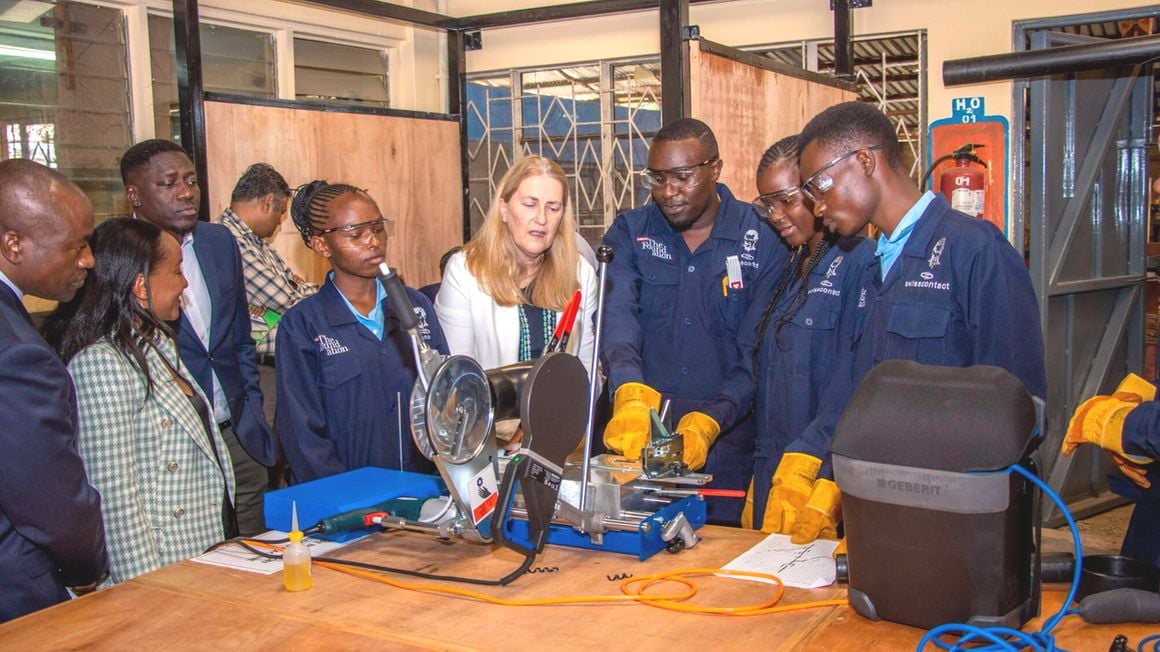
Swiss State Secretary for Economic Affairs Helene Budliger Artieda engages with plumbing apprentices at Don Bosco Boys Technical Institute in Karen, Nairobi. FILE PHOTO | POOL
Elizabeth Bosibori, 20, is only three months into her two-year on-the-job training, but she is already buzzing about her skills in plumbing.
Since joining Davis & Shirtliff, a leading water and energy solutions provider in East Africa, as an apprentice in January, she has been out on the field regularly understudying technicians drilling and installing boreholes or repairing water treatment systems in upmarket neighbourhoods in Nairobi and Kiambu counties.
“My mentor assigns a technician to me to ensure I learn as much as I should whenever we are in the field. Some of the most exciting moments for me so far have been accompanying the teams implementing borehole projects,” says Ms Bosibori, who is also studying for a plumbing diploma at Don Bosco Boys Training Institute in Nairobi.
She is among more than 80 young Kenyans – most of them from Nairobi’s informal settlements – who were in November last year enrolled in a skills programme in which apprentices spend one week a month taking theory lessons in a vocational training institute and three weeks learning on the job at a company.
Swisscontact, a development NGO which works with the private sector to reduce poverty in developing countries, introduced the programme dubbed PropelA as part of efforts to tackle youth unemployment in Kenya.
The programme is modelled on the Swiss dual approach to learning where training institutions and the private sector co-create the curriculum for technical training.
Read: State to pay pension savings for 15m Jua Kali workers
Under this model, trainees spend 25 percent of their time in class and 75 percent gaining hands-on experience in the industry.
Helene Budliger Artieda, the Swiss Minister for Economic Affairs who toured Don Bosco during her visit to Kenya last month, attributed the low unemployment rate of 1.8 percent in Switzerland to market-driven training.
“Our experiences show that private sector involvement in training is key, as it ensures the diploma holders are trained according to the needs of the labour market. These professionals are an essential part of the success of the Swiss economy and explain the low unemployment rate, including among the youth,” said Ms Artieda.
Under the administration of former President Mwai Kibaki between 2002 and 2013, Kenya appeared to downplay the importance of technical and vocational education and training (TVET) in its education policy, converting a number of mid-level colleges into constituent campuses of public universities.
The two succeeding administrations, including the current one, have been seen to put TVET at the centre of job creation efforts by offering students fee subsidies and access to financing from the Higher Education Loans Board (Helb).
But the industry continues to complain about a mismatch of jobs and skills, often forcing them to retrain recruits from local vocational education colleges.
Lillian Mwai Ndegwa, country director of Swisscontact. FILE PHOTO | POOL
Lillian Mwai, the Swisscontact country director in Kenya, says the PropelA programme was conceived to train plumbers and electricians to help plug the skills gap in construction, which has recorded remarkable growth amid a bump in public and private investments in infrastructural development in recent years.
“We knew about the growth in the construction sector, but not so much the pain points. When we talked to industry players we discovered there was a serious mismatch between the skills needed by the job market and what the training institutions were producing. Some companies told us about their experiences dropping multi-million shilling contracts because they lacked the right personnel to execute the projects,” says Ms Mwai.
A 2020 survey by the Ministry of Labour that looked at the skills gap at the enterprise level in the informal sector—where more than 80 percent of Kenyans are employed — showed that difficulty in finding desired technical skills was the reason they had vacancies.
About 55.9 percent of the firms that had labour shortages in the architecture and building sectors cited difficulty in getting the desired skills such as plumbing.
In 2021, Swisscontact approached a number of local companies in plumbing and electrical installations with a proposal to try out the Swiss-type dual apprentice training and took their representatives on a tour of Switzerland to see how the programme works.
Also read: Opportunities that are on offer under affordable housing
Twenty plumbing and electrical installation companies who bought into the idea and recruited apprentices in November have put them on stipends and paid their fees for the theoretical lessons at Don Bosco Boys Training Institute and Eastlands College of Technology.
Aston Mwendwa, who chose to join the program rather than take up his placement at a public university for an electrical degree course, says he was attracted by the high prospects of employment upon completion of the two-year programme and the quality of training he is receiving at Mehta Electricals based in Nairobi’s Industrial Area.
“As a junior technician, I have learnt a lot from my co-workers already,” says Mr Mwendwa.
"Before I joined the programme, I was a self-taught electrician and I would fix a few electrical problems for households in Githurai where I live. But here you get to learn industry standards, not do things the jua kali (informal) way.”
→ jkotieno@ke.nationmedia.com




No comments :
Post a Comment